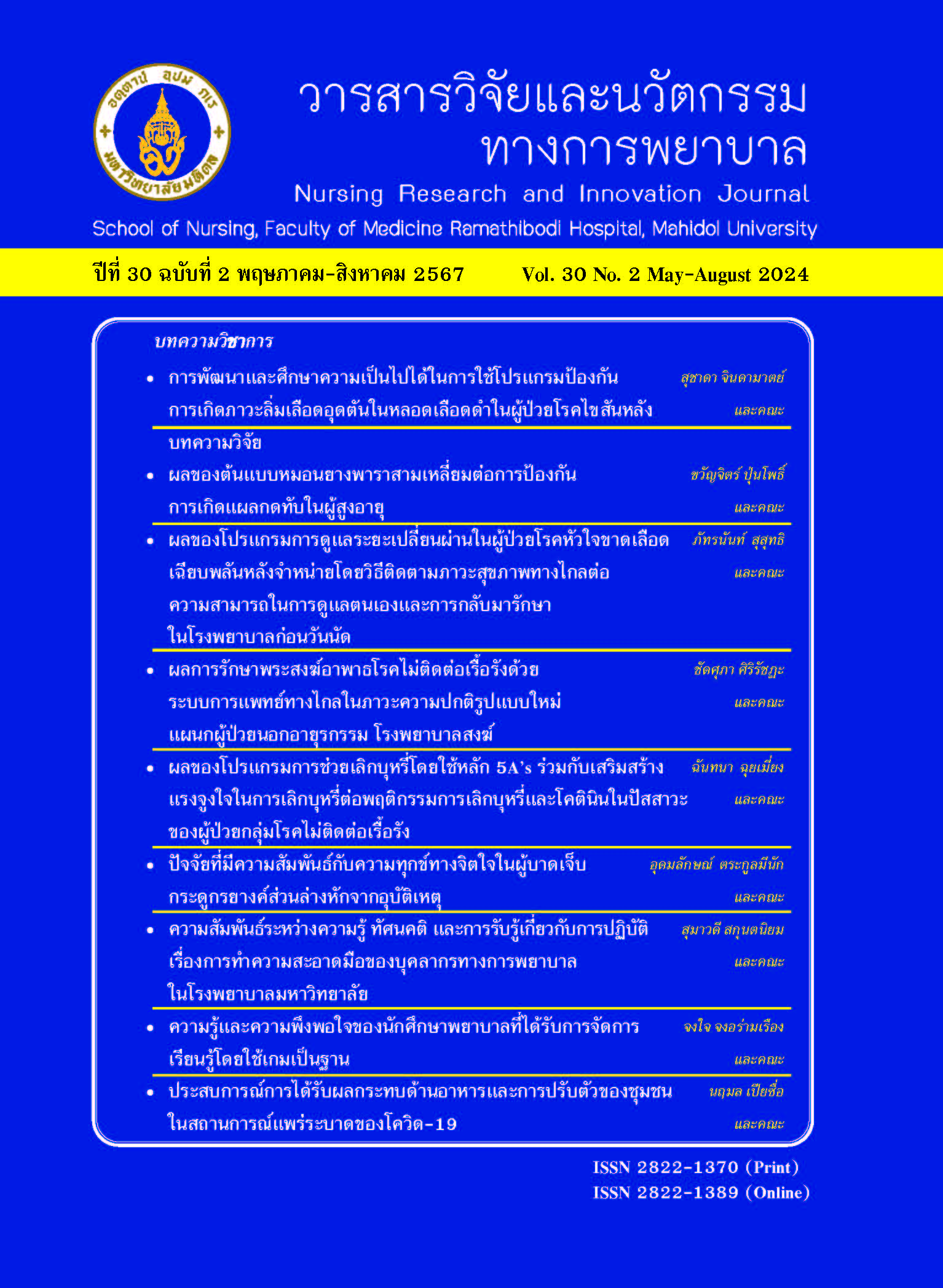Nursing Students’ Knowledge and Satisfaction after Receiving Game-based Learning
Main Article Content
Abstract
This mixed methods research aimed to examine nursing students’ knowledge and satisfaction after receiving game-based learning. The research sample comprised the thirdyear students of Ramathibodi School of Nursing who experienced game-based learning regarding nursing care for children with dengue fever. In the quantitative research design, 98 nursing students were recruited using purposive sampling. The research instruments consisted of the Pretest and the Posttest Questionnaires on Knowledge of Nursing Care for Children with Dengue Fever and the Satisfaction with Game-based Learning Questionnaire. Quantitative data were analyzed using descriptive statistics and one-way repeated measures ANOVA. For the qualitative research design, an in-depth interview was conducted with 17 third-year nursing students who received the game-based learning. Qualitative data were analyzed using content analysis. The findings showed that the knowledge score after learning ended immediately was higher than before providing the game-based learning. The knowledge score after one month was lower than after learning ended immediately but higher than the knowledge score before providing the game-based learning. Nursing students who experienced game-based Learning were very satisfied. The results from the in-depth interview revealed that the D-Keng game helped promote learning, build learning motivation, and encourage learner-learner interaction. Based on the research findings, game-based learning should be encouraged in nursing education.
Keywords: Game, Game-based learning, Knowledge, Nursing students, Satisfaction
Article Details

This work is licensed under a Creative Commons Attribution-NonCommercial-NoDerivatives 4.0 International License.
บทความ ข้อมูล เนื้อหา รูปภาพ ฯลฯ ที่ได้รับการตีพิมพ์ในรามาธิบดีพยาบาลสาร ถือเป็นลิขสิทธิ์ของวารสาร หากบุคคลหรือหน่วยงานใดต้องการนำทั้งหมดหรือส่วนหนึ่งส่วนใดไปเผยแพร่หรือเพื่อกระทำการใด ใด จะต้องได้รับอนุญาตเป็นลายลักษณ์อักษรจากรามาธิบดีพยาบาลสารก่อนเท่านั้น
References
Thanormchayathawat B, Vanitsuppavong P, Niemted W, Portjanatanti N. 21st Century skills: a challenge for student development. The Southern College Network Journal of Nursing and Public Health. 2016;3(2):208-22.(in Thai)
Bundasak T, Chaowiang K, Jangasem N. Happily learning among nursing students. Journal of MCU Peace Studies.2017;5(1):358-69. (in Thai)
Persada SF, Miraja BA. Understanding the generation z behavior on K-learning: a unified theory of acceptance and use of technology (UTAUT) approach. Int J Emerg Technol Learn. 2019;14(5):20-33.
Jamjuree D. learning design for Gen Z learner. Bangkok:Graduate School of Srinakharinwirot University; 2020.(in Thai)
Paksa P, Jansuwan N. Learning management with student-centered learning for generation Z learniers. Journal of Graduate Research. 2022;13(2):1-12. (in Thai)
Chaeye K, Thammajinda O-A. Effects of enjoyable obstetrics online game on knowledge and satisfaction of learners. Journal of Nurses Association of Thailand Northern Region. 2020;26(1):54-65. (in Thai)
Ozdemir EK, Dinc L. Game-based learning in undergraduate nursing education: a systematic review of mixed-method studies. Nurse Educ Pract. 2020;62:1-10.
Xu Y, Lau Y, Cheng LJ, Lau ST. Learning experiences of game-based educational intervention in nursing students: a systematic mixed-studies review. Nurse Educ Today. 2021;107:1-16.
Tavares N. The use and impact of game-based learning on the learning experience and knowledge retention of nursing undergraduate students: a systematic literature review. Nurse Educ Today. 2022;117:1-6.
Volejnikova-Wenger S, Andersen P, Clarke K. Student nurses’ experience using a serious game to learn environmental hazard and safety assessment. Nurse Educ Pract. 2021;98:1-7.
Zugai JS, Orr F, Levett-Jones T. Online gamified quizzes in undergraduate mental health nursing education: thematic analysis of students’ qualitative views. Issues in Mental Health Nursing. 2020;43(8):789–93.
Saiboonsri U, Kesonsuwan C, Nantasanee S, Deeprasert A. The effectiveness of game based learning for enhancing academic achievement in mental health promotion and psychiatric nursing studies among the third-year nursing students at faculty of nursing, Suan Dusit University. Suan Dusit Graduate School Academic Journal. 2023;19(1):129-43. (in Thai)
Hemadhulin S, Chuamuangsan D, Kaewviengdach C,Sittikan S, Buahom C. The effects of learning management using APGAR score game on APGAR score knowledge and satisfaction of second-year nursing students. Journal of Health Science. 2023;32(4):723-31. (in Thai)
Thongpradab J, Lohacheewa S, Preeyanon L. Effects of game-based learning on nursing students’ knowledge of English psychiatry terminology. Journal of Thailand Nursing and Midwifery Council. 2022;37(4):111-24.(in Thai)
Wichainate K, Wannarit L-O, Yodmool N, Armat T,Numyongyai T, Somboontawee A. Effects of game-based learning “Multi-Shevana” titled antibiotics on knowledge and satisfactions among second year air force student nurses, academicyear 2022. Regional Health Promotion Center 9 Journal. 2023;17(3):1078-91. (in Thai)
Jamjang S, Thongthieng W, Kumyod S. Effects of using online game on readiness preparation of nursing practice for the development of drug administration knowledge for nursing students. The Journal of Faculty of Nursing Burapha University. 2022;30(3):1-15. (in Thai)
Chang Y, Hu SH, Kuo S, Chang K, Kuo C, Nguyen TV,Chuang Y. Effects of board game play on nursing students’ medication knowledge: a randomized controlled trial.Nurse Educ Pract. 2022;63:1-7.
Chaeye K, Jantharangkul S, Aunmuang S. Effects of vocabulary games in fundamental nursing course (SN201)of The second McCormick Nursing Student Payap University. Journal of Nursing Science & Health.2012;35(2):83-90. (in Thai)
Injui R, Chiewsothorn S, Prasittivatechakool A, Proyngern J. The effects of using gamification learning activities on learning motivation and Satisfaction among the royal Thai army nursing students. Journal of The Royal Thai Army Nurses. 2020;21(2):377-88. (in Thai)
Davidson SJ, Candy L. Teaching EBP using game-based learning: improving the student experience. World Evid Based Nurs. 2016;13(4):285-93.
Thorndike RM. Measurement and evaluation in psychology and education. New York: John Winey and Sons; 1991.
Keller JM. Motivational design for learning and performance: The ARCS model approach. Boston:Springer; 2010.
Krejcie RV, Morgan DW. Determining sample size for research activities. Educ Psychol Meas. 1970;30:607-10.
Lungka P. Effect of game-based learning on learning achievement of undergraduate students inearly childhood education course. Journal of Educational Research.2021;16(1):112-23. (in Thai)
Miles MB, Huberman AM. Qualitative data analysis: an expanded sourcebook. Thousand Oaks: Sage; 1994.
Guba EG, Lincoln YS. Epistemological and methodological bases of naturalistic inquiry. Educational Communication and Technology. 1982;30(4):233-52.


